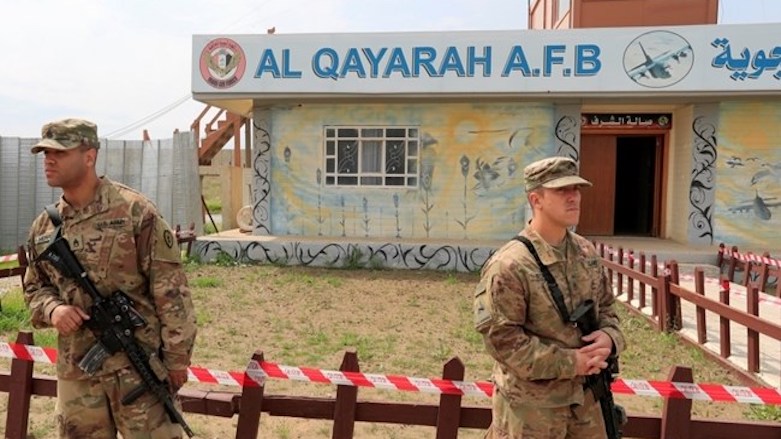Coalition to continue Iraq operations, as Patriot missiles arrive, and base consolidation proceeds
The Coalition will continue to help and assist the Iraqi Security Forces with missions to defeat ISIS in the Hamrin mountains, in the Qarachokh area, the Nineveh Plains...

WASHINGTON DC (Kurdistan 24) – “The Coalition will still operate in Iraq,” Col. Myles B. Caggins III, Coalition military spokesman, told Kurdistan 24 earlier this week, as the Coalition, formally known as Combined Joint Task Force-Operation Inherent Resolve (CJTF-OIR), turned over the K-1 airbase near Kirkuk to the full control of the Iraqi government.
CJTF-OIR will continue to “help and assist the Iraqi Security Forces (ISF) with missions to defeat ISIS in the Hamrin mountains, in the Qarachokh area, the Nineveh Plains to make sure that ISIS does not come back and is not a threat to the people of Iraq ever again,” Caggins said on Sunday.
US Air Defense Batteries in Iraq, including in Kurdistan Region
On Monday, Agence France-Presse (AFP), citing US and Iraqi military sources, reported that the US had deployed Patriot air defense missile batteries to air bases in Iraq to protect Coalition troops.
Erbil and Al-Asad Air Base, in western Iraq, are two of the facilities to which the missile batteries have been sent, the news agency said.
“One of the Patriot batteries was deployed to Ain al-Asad last week and was being assembled, according to a US defense official and an Iraqi military source,” AFP reported. “Another battery was deployed to a base in Erbil, the capital of Iraq’s autonomous Kurdish region, the US official said.”
Additionally, two more batteries are in Kuwait, awaiting dispatch to Iraq.
Early this year, senior US officials held an unusual set of back-to-back high-level meetings with senior Kurdish officials. In January, President Donald Trump met with the President of the Kurdistan Region, Nechirvan Barzani, at the World Economic Forum in Davos, Switzerland.
In February, Masrour Barzani, Prime Minister of the Kurdistan Regional Government, met with the US Secretaries of State, Defense, and Energy at the Munich Security Conference.
Iran was a prominent topic of discussion in those meetings. They included a request from the Kurdish leadership for air defense protection for Erbil, as it had been targeted by Iranian ballistic missiles, following the Jan. 3 assassination of Qasim Soleimani, head of the Quds Force of Iran’s Islamic Revolutionary Guard Corps.
Consolidation of CTJF-OIR Presence in Iraq
The repositioning of troops and the introduction of air defense batteries are part of a shift in the Coalition’s approach in Iraq.
“CJTF-OIR is consolidating its force presence in bases that are more defensible and allow it to continue its mission in support of Iraqi forces,” Nicholas Heras, Middle East Portfolio Manager at Washington’s Institute for the Study of War, told Kurdistan 24.
“As the ISF [Iraqi Security Forces] improves its capabilities and can ‘own’ more territory in Iraq to root out ISIS, there is less need for Coalition forces to be in so many far-flung bases inside Iraq,” he said.
As Caggins told Kurdistan 24, “The Coalition, for several months, since 2019, has been planning to transfer some of the Coalition area inside Iraqi bases to full control of the Government of Iraq.”
“Some 3,000 Coalition personnel” will leave the Kirkuk base, he said, “and transfer more than $1 million of property to the Government of Iraq,” stressing, “the transfer is happening in full coordination with the Government of Iraq, and, again, it is because of the success of Iraqi Security Forces against Da’esh.”
Sunday’s handover of the Kirkuk airbase follows similar transfers at Qayyarah airbase, south of Mosul, and the al-Qaim base in western Iraq.
Warning to Iranian-backed Militias and Iran
Attacks from Shia militias aimed at Coalition forces on Iraqi bases have continued since the US-Iranian confrontation peaked with the Jan. 3 assassination of Soleimani, followed by Iran’s Jan. 8 retaliatory ballistic missile attack.
Asked on Tuesday about the ongoing assaults from Iraqi militias, Secretary of State Mike Pompeo told journalists, “We will always respond to protect and defend Americans.”
“We will respond if they are threatened,” Pompeo affirmed. “We’ve also made clear that, in Iraq in particular, we know that those Shia militias who have attacked the Americans are trained, equipped, underwritten, by the regime of the Islamic Republic of Iran.”
“It’s been President Trump’s policy consistently that says that we will respond against all of those who facilitated, trained, equipped, and enabled those attacks on America,” the Secretary continued, as he suggested a range of possible targets of US retaliation if the attacks continued.
Editing by Karzan Sulaivany